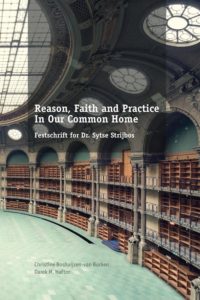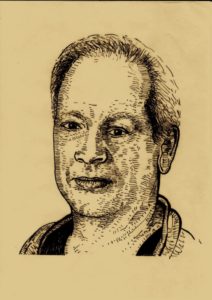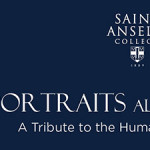Reflections On The CPTS Model Of Interdisciplinarity ~ Festschrift for Dr. Sytse Strijbos
 Introduction
Introduction
In this short paper, I adopt the role of ‘critical friend’ to the Centre for Philosophy Technology and Social Systems (CPTS)[i] research programme, and the contribution of Sytse Strijbos in particular: I believe the CPTS model of interdisciplinarity has some significant strengths, and also some potential weaknesses that the researchers taking it forward might wish to address. Most of my critique refers to Strijbos and Basden (2006a), as this offers the grounding for the rest of the CPTS research programme. However, my focus on this should not be taken as a sign that I regard other contributions as less significant.
Over the coming pages I will first of all highlight what I see as the strengths of the CPTS model, focusing in particular on the value of the systems approach embodied in it, and its potential applicability to technologies beyond information systems (the practical focus of most CPTS authors to date). I will then offer two critiques. The first points to a gap in the model: the omission of ecological systems as an aspect of analysis. The second critique raises some questions about the nature of the links between research at the levels of the artefact and directional perspectives. I suggest that, when there are significant disagreements on the ethics of a technology, to the extent that some researchers wish to prevent its development and others wish to press ahead, we have to ask whether and how interdisciplinary co-operation should proceed.
The Strengths of the CPTS Model
In my view, the CPTS model of interdisciplinarity has several important strengths: it is explicit about its theoretical underpinnings; is inclusive of ethical debates; takes a useful systems approach to understanding the relationships between fields of inquiry; is potentially applicable to a broad range of technologies; and can enable the incorporation of many more disciplines than are currently included in the CPTS research programme. I discuss each of these strengths in turn below.
2.1 The Value of Explicit Theory
The first strength is that there is an explicit theoretical rationale for the focus on basic technologies, technological artefacts, socio-technical systems, human practices and directional perspectives as the principle concerns flowing into interdisciplinary engagements. As Strijbos and Basden (2006a) make clear, these categories are derived from the philosophy of Dooyeweerd (1955). Although I am not in complete accord with Dooyeweerdian thought, I nevertheless appreciate that there is a coherent set of ideas lying behind the CPTS model. This is important because it takes us a step beyond models that are simply born out of strategic alliances between researchers from two or more disciplines who happen to share common interests. While alliances like these can be useful for pursuing focused projects with particular purposes, it is difficult for them to give rise to more general models of interdisciplinarity unless there is a focus on providing some theory that explains why the model might have utility beyond the immediate local circumstances in which it was generated. Read more
A Dooyeweerdian Critique of Systems Thinking ~ Festschrift for Dr. Sytse Strijbos
 Abstract
Abstract
Systems thinking has developed over the decades, into several streams, which seem to operate in parallel with little dialogue between them. Each stresses different theoretical issues or problems but, in addressing them, other deeper problems are revealed that are often ignored. This essay briefly reviews three of the streams with the theoretical issues they tackle, and some of the deeper problems. To address these deeper problems, and also to facilitate dialogue between the streams, Dooyeweerd’s philosophy is employed to reintepret the theoretical issues in new ways, in which meaning is central. This initial proposal calls for further research.
Introduction
In its various forms, systems theory has been employed as a framework for understanding many issues, most related to the relationship between entities and environment. Systems thinking has developed over the decades, into several streams, each of which stresses different theoretical issues: holism, the system, its parts and its environment, and societal systems. As such, each stream throws up new problems, some of which are ignored, (“elephants in the room”). (The use of the word ‘system’ as in ‘systematic’ is not considered here.)
Sytse Strijbos (2010) sought to bring together systems thinking with Dooyeweerdian thinking, especially discussing how systems thinking may be interdisciplinary and bringing in a concern with normativity that most systems thought lacks. However, there has been no systematic consideration of how Dooyeweerdian thinking can dialogue with systems thinking in each of its forms.
This article explores the contribution that Dooyeweerd’s (1955) ideas can make more generally to addressing such problems, including his law-oriented view of subject and object, his idea of irreducibly distinct aspects, and his presupposition that meaningfulness, rather than existence, is the foundation. First, issues that are important in several systems discourses are identified, along with problems. Then these are discussed in the light of Dooyeweerdian thought.
Systems Thinking in its Varied Forms
For convenience of discussion, systems thinking is separated into three streams, which stress different major issues, and each of which contains several discourses. The discourses overlap and some discuss issues from other streams. A number of critical questions or problems will be raised as the discussion proceeds. Read more
Reason, Faith And Practice In Our Common Home, South Africa ~ Festschrift for Dr. Sytse Strijbos
 “No one can be clever and ecstatic at the same time.” – Sir A Quiller-Couch
“No one can be clever and ecstatic at the same time.” – Sir A Quiller-Couch
Introduction
Three elements of the overall theme, Reason, Faith, and the idea of Our Common Home are found in different cultural constructions or formations in the South African context. These formations have often combined or interacted with destructive results, and have at other times formed constructive, life-giving combinations.
Firstly, a few examples will be given of specific cultural formations and combinations of these themes. That will be followed by reflection on how we can arrive at constructive, life-giving combinations of these formations, with a practical example from the African context of what could be done. There are more factors that could be included in the mix that are not considered here.
The view of reason and “our common home” in the Verligte Beweging among Afrikaners
In the 1970’s and the 1980’s there was a movement in the Afrikaner-establishment that was called the Verligte Beweging, the Enlightened Movement, that reminds one of the Aufklärung in Europe. The leading figure of this movement was Willem de Klerk, a theologian and journalist and the brother of FW de Klerk, the leader of the National Party (NP). FW de Klerk was the person who, as president of the white minority government, officially declared that the policy of apartheid would be replaced by a full democracy, in a historic speech on 2 February 1990.
In a book about his brother FW that was published in 1991, Willem de Klerk stated that the basic concept of the Enlightened Movement was togetherness (gesamentlikheid), based on reason as the natural law of the human soul. He quoted the historian Barbara Tuchman’s The March of Folly (1984): “Rejection of reason is the prime characteristic of folly…. When desire disagrees with the judgement of reason, there is a disease of the soul. And when the soul is opposed to knowledge or opinion or reason, which are her natural laws, that I call folly….” (De Klerk, 1991 pp. 130, 144-145).
Togetherness was seen as the opposite pole of separateness (apartheid), which was not rejected out of hand, sometimes for strategic reasons and sometimes, it seems, as a matter of principle. The idea was to find a balance between togetherness with other cultural groups and maintaining an own identity. Willem de Klerk described how this movement convinced the Afrikaner in general, and FW himself, to move their policy from the one pole (separateness) closer to the other (togetherness), and to leave apartheid behind. In his conclusion he talked of FW’s conversion to the idea of togetherness based on reason (1991, pp. 145-146). This thought construction became dominant in Afrikaner circles at the time, and when it combined with the drive for reconciliation of leaders like Nelson Mandela and Desmond Tutu, a peaceful transition to democracy in a deeply divided country became possible, which led to a lot of optimism. This was a noteworthy contribution!
Twenty-five years later this optimism is under a lot of pressure, but it is still alive. The question is if it was, and is, sufficient to put all one’s confidence in reason as answer to all the movements of the human spirit in this turbulent country. Read more
Gijs van Oenen ~ Overspannen democratie. Hoge verwachtingen, paradoxale gevolgen
Democratie wordt niet bedreigd door mensen die tegen democratie zijn, maar juist door degene die zeer enthousiast zijn over de democratie, aldus Gijs van Oenen. Wij lijken nooit genoeg democratie te hebben. Het succes van de democratie keert zich nu tegen zichzelf.
“Voor elk vraagstuk dat speelt wordt de democratie verder opgerekt: meer, meer democratie; meer, meer luisteren naar de burger”, aldus Van Oenen. Burgers verwachten teveel van de democratie.
In het essayistisch geschreven boek analyseert Van Oenen het falen van de democratie, waarbij hij het neoliberalisme als een van de belangrijkste oorzaken aanwijst. De democratie heeft zich uitverkocht aan marktkrachten en burgers zijn democratische processen gaan percipiëren in termen van marktgeoriënteerd handelen en consumentisme. Maar ook de tegendemocratie (Baudet en Denk) en populistisch betoog, van zowel links als rechts, dragen bij aan het klimaat van steeds ‘meer, meer’. Ook “wantrouwen, uitdagen en ‘tarten’ vormen (…) een steeds meer geaccepteerd middel of wapen in het politieke repertoire”. De burger ervaart een gebrek aan responsiviteit. De Franse politieke denker Pierre Rosanvallon spreekt in zijn boek ‘La contre-démocratie’ zelfs van een politiek tijdperk van défiance.
Hoe komt het dat dit sentiment nu zo opspeelt, om steeds ‘meer, meer’ te vragen, steeds ‘beter’, ‘beter’, ‘beter’, ‘alles uit jezelf te willen halen’?
We zijn niet opgewassen “tegen processen die een onverbiddelijke economische, technologische of financiële logica volgen” die overheersend zijn in onze democratie; dan kom je met burgerparticipatie niet ver. De openbaarheid staat zwaar onder druk van “vermarkting en financialisering, en daarnaast ook van ontwikkelingen rondom nieuwe media, tegenpublieken, globalisering en interculturalisering”, aldus Oenen. De participatie paradox heeft tot een scheve democratie geleid. Read more
Three Secular Seductions: One nation, One government, One science ~ Festschrift for Dr. Sytse Strijbos
 Introduction
Introduction
Is evidence-based politics [i] an idea a monolithic view of society? In one version of such a monolithic view, it is (a) the government that directs a society within (b) the boundaries of a nation-state, giving much credit to (c) the ‘oracles’ of science in the process to take its policy decisions.
In this essay I try to clarify why this monolithic view of society is dangerously flawed. Part of the reasoning below will be a description of
1) pluralities that are real, but obscured within a seemingly monolithic view of a government, a nation-state and/or science.
2) a religious or pseudo-religious status that willingly or unwillingly can be assigned to (a) the role of a government, (b) a nation-state and its boundaries; and/or (c) an evidence-based approach of political decision-making. The focus of this essay will be on the latter (c), which usually implicates an appeal to science. However, from the outset it must be clear that this essay is not a plea for fact free politics. On the contrary, the careful, methodical or scientific, academically embedded search for relevant information is recognized as an asset. Dangerous effects of the evidence-based approach are related to the supposed status of the academic expert and its possible anti-democratic or other restrictive effects.
Although applicable within the wider context of North-Atlantic (‘Western’) culture, Sytse Strijbos’ homeland, the Netherlands, is the assumed political context for the contentions that follow. Specifically, at the end of this essay (section 6.2) I will refer to a recent report published – in Dutch – by the Council for Public Health and Society in the Netherlands. In this report the approach of evidence-based practices in health care is criticized and at least relativized. This report is important because the government – every government – has a responsibility for public health and its funding.
Disclosive Systems Thinking, to which the name of Sytse Strijbos adheres firmly, represents an interdisciplinary and pluralistic, multi-aspectual approach to societal issues. Because of its pluralistic nature it provides several clues to dissect monolithic views. Specific philosophical sources fuelled this pluralistic look and feel of Disclosive Systems Thinking. These sources will be used to guide this dissection of ‘one nation, one government, one science’ into its constituents and to understand clashes both between these three domains and within each of them. These clashes can be multicultural tensions, parliamentary debates or deadlocks, or scientists disagreeing because of conflicting paradigms. The selection of these three seductive domains out of many more domains (money, music, drugs, …) is guided by the current popularity of evidence-based politics [ii] and its context: ‘evidence’ is expected from science; ‘politics’ is expected from the government; and a national government, to which I restrict myself here, assumes a nation state as context for its policies. Read more
Celebration of Sytse Strijbos’ Academic Achievements ~ Festschrift for Dr. Sytse Strijbos
 This remark is in honour of Professor Emeritus Sytse Strijbos. His work for the Centre for Philosophy, Technology and Social Systems (CPTS), which later evolved into the International Institute for Development and Ethics (IIDE) has been highly important for me as a PhD student, and later, for my professional career and guidance of own PhD students. The common denomination in our work relates to our interest in Systems Thinking and Herman Dooyeweerd’s philosophy.
This remark is in honour of Professor Emeritus Sytse Strijbos. His work for the Centre for Philosophy, Technology and Social Systems (CPTS), which later evolved into the International Institute for Development and Ethics (IIDE) has been highly important for me as a PhD student, and later, for my professional career and guidance of own PhD students. The common denomination in our work relates to our interest in Systems Thinking and Herman Dooyeweerd’s philosophy.
We met the first time more than 20 years ago, at the Free University of Amsterdam where Sytse had organized a one-day seminar. This was the beginning to our annual conferences, which included researchers and PhD students from Sweden, The Netherlands, UK, and later, South Africa. The conferences were held at Sytse’s home town in Maarssden, at an old house which used to be a convent. We conveniently stayed in the same building as where the conferences were held and the nuns, who now had moved to a newer convent, provided full time lodging for us. The surroundings of this venue were beautiful and inspirational for many interesting conversations.
In preparation for each conference, the participants shared their draft papers before hand so that others could reflect on the content and prepare comments and questions. The presentations were given lengthy time to allow for comprehensive reviews. After each presentation, when Sytse’s lead the discussion, he divided into: first, Questions/Comments for clarification; second, Questions/Comments for critique. This division was very helpful for me as a student. If it was a question for clarification, I needed to be more clear in my explanation; if it was a question for critique, I needed to reflect on my standpoint and provide better arguments (or abandon). What was also very helpful, a few days after each presentation and discussion, each presenter had to reflect on what was brought about and give feedback on what they intended to act on. In that way, the others got recognition of what had been influential for further development of the work and how they might have contributed to this. Read more



